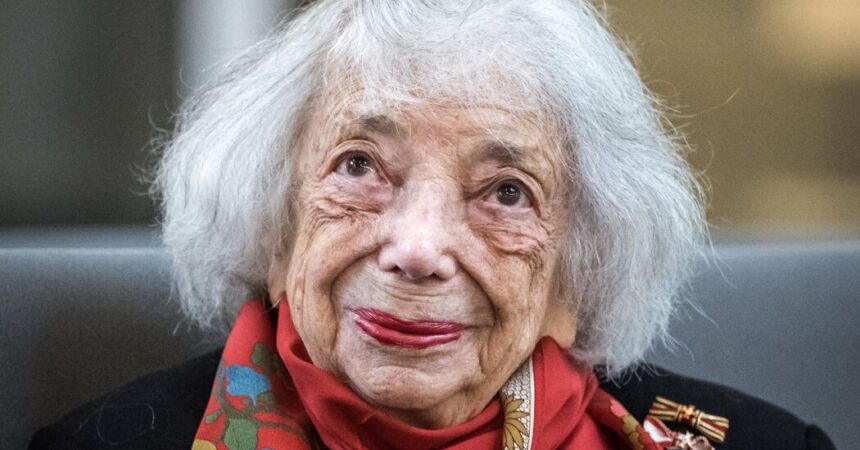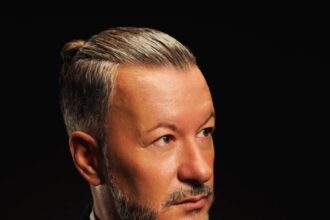Margot Friedländer, a survivor of the holocaust who spent more than 60 years in exile (as he saw) in New York City before returning to Germany in 2010 and finding his voice as a defender of the memory of the Holocaust and Gerembrance and Gerebren and Gereberbance and Gerembrance and Gereberbance and Gerembrance and Gerembrance and Gerebren and Gerebren and Gerebren and Gereberen and Gereberen and Gereberen and Gereberen and Gereberen and Gereberen and Gerebren Gerebebrance and Gerebere Gerebrance and Gerebere and Gerebereberbance and Gereberebereberebereberebebrance and Gerebereber and Gerembrance and German and German died on Friday in Berlin. She was 103 years old.
His death, in a hospital, was announced by the Margot Friedländer Foundation, a promotion tolerance of the organization and democracy.
“It helps me talk about what happened,” he told the members of a UNICEF club in 2023. “You young people help me because they listen. I no longer bottine. I share my story for all of you.”
Mrs. Friedländer and her husband, Adolf, known in the United States as Eddie, for obvious reasons, arrived in New York in the summer of 1946. They settled in a small apartment in Kew Gardens, Queens. He found the work found as the commitment of the 92A Street and, the cultural center on the east side of Manhattan, and she became a travel agent.
The couple had married in the camp where both were admitted; Once in the United States, they never talked about their shared experience. Mr. Friedländer insisted that he never return to the country that had killed their families. But when she died in 1997, Mrs. Friedländer assigned to wonder what had been left behind.
He had found a community in the Y and, at the request of Jo Frances Brown, who was the director of the program there, he enrolled in a class writing class. They spent weeks before she participated, however. The other students, all born in the United States, were writing about their families, their children, their pets. One night, unable to sleep, he began writing, and the first stories he told were his first memories of childhood.
The stories became a memory, “try to make your life”: a Jewish girl hidden in Berlin Nazi, “written with Malin Schwerdtfeger and published in Germany in 2008 (an English edition came out in 2014).
But she had already found her mission. Thomas Halaczinsky, a documentary filmmaker, heard that Mrs. Friedländer was working in a memory, and in 2003 she persuaded her to return to Berlin and make her story, she reviewed the city where she had grown up. Mr. Halaczinsky’s film, “Don’t Call It Hostile”, the word is freely translated as “nostalgia”, came out the following year.
The experience of returning to Berlin Galvanized. She felt welcome by the city that had once rejected her. He began talking to young people in schools throughout the country, surprised that many had no understanding of the Holocaust.
Mrs. Friedländer was 21 years old when the Gestapo came for her family. He was on his way home from his work on the night shift in an arms factory, and his younger brother, Ralph, had been alone in his apartment. He arrived to find his sealed and protected forehead.
Hide the yellow star of his coat that proclaimed his identity as a Jew, ms. Friedländer slipped to a neighbor’s house. There, he learned that his mother had given himself to the police to be with his 16 -year -old son, a shy son and Bookish. He had left his daughter his bag with a talisman, an amber accounts necklace, a addiction notebook and a letter message, delivered by the neighbor: “Try to make his life.”
He walked for hours that first night, and in the morning he got into a hairdresser and made the dark hair tizian Ed. He spent the next 15 months hidden, or stopping for only one night or two hands, followed he passed through the Berlin Berlin Berlin Berlin Berlin Berlin Berlin Berlin Berlin Berlin Berlin Berlin Berlin Berlin Berlin Berlin Berlin Berlin Berlin Berlin Berlin Berlin Berlin Undergrounds.
There was an apartment of rank, with uncertainty of dirt where he stayed inside for months, with a dog for company. The couple who expected sex as rent (Mrs. Friedländer declined). The infested bedbugs. The game of the game. The man who gave him a cross to use and turned it into a plastic surgeon that straightened his Neose for free, so that he could pass as a gentle and venture in public. The kind couple with a prosperous black market business in food.
None or their hosts were Jews. But it was the Jews who delivered it: two men who were the so -called Jewish receptors, who worked for the Gestapo to save themselves from deportation.
After her capture, Mrs. Friedländer was sent to Theresienstadt, a town of Bohemia that the Germans had become a hybrid station in Ghetto and Campos. It was June 1944. Many stops were sent to be exterminated, but some 33,000 people died in Theresienstadt, where the disease was unbridled and the food was Carce.
There, Mrs. Friedländer with Adolf Friedländer, whom she had met in Berlin in a Jewish cultural center where he was the administrative director and worked as a seamstress in the costume department. She thought a lot about him at that time. It was 12 years older, with show and taciturn. She found him arrogant. But in Theresienstadt, friends and confidants became, studying about their missing life in Berlin.
When he asked her to marry him, she said yes. They were the won days, and their guards had approached to flee as the Russian army.
They were married to a rabbi in June 1945, with a prayer mantle hero on their heads like Huppaá. They found an old cup of porcelain to crush, as tradition was required. Mrs. Friedländer saved a piece.
A year later, they sailed to the port of New York. When the statue of freedom emerged from fog, Mrs. Friedländer was ambivalent. Here was the symbol of freedom, but, as he wrote in his memoirs, the United States had not welcomed the family when they needed it most. He was stateless and would feel like this during the next six decades.
Anni Margot Bendheim was born on November 5, 1921 in Berlin. His mother, Auguste (Gross) Bendheim, came from a prosperous family, but was independently and had started his own business to make buttons he delivered, reluctantly, with Margot’s father, Arthur Blessed, when they got married. The marriage was unhappy and the couple divorced when Margot was a teenager.
Margot loved fashion, and went to the School of Commerce to study drawing for fashion and advertising. At the beginning of 1937, he began learning in a clothing. Nuremberg’s laws had been in force for two years, stripping the Jews of their rights and businesses. Margot’s mother was desperate to emigrate, but her father, who had two disabled brothers, refused. Not only are there quotas that restrict the number of Jewish emigrants to the United States and other host countries, but disability and disease were disqualifiers.
After divorce, Auguste worked feverishly to find an exit. Many expected evaporated, like the documents promised by a man who came up with his money and disappeared.
Margot and Ralph were conscribed to work in a factory that made armament for the German army. Duration in this period, his father emigrated to Belgium, without paying attention to the circumstances of his ex -wife and children. Later I would do it in Auschwitz.
Mrs. Friedländer took a year to learn the fate of her mother and brother. Their deaths were confirmed in 1959, but another four decades would pass before she learned the details, from deportation lists at the Leo Baeck Institute in New York City, a German archive or Jewish history. They also had Auschwitz legs. His mother had a leg to the gas chamber upon arrival; His brother, a few months later.
Mrs. Friedländer returned to Berlin in 2010. Since then, she had made her mission to tell her story, especially for young people. In 2023, he received the Federal Cross of Merit, the greatest honor of the German government.
“She always said she had four lives,” said Halaczinsky, the filmmaker, in an interview. “Without the movie, I don’t know if I would have returned to Berlin. But he did, and found a new life. She was a powerful woman; she must have a tremendous effort in her leg.”
Last summer, Mrs. Friedländer appeared on the cover of the German Vogue, Beander with a bright red coat. There was only one cover line: the word “love”, the theme of the subject, became the trembling italic of Mrs. Friedländer, with her signature underneath.
She told the magazine that she was “horrified” by the emergence of anti -Semitism and nationalism of the extreme right. But she warned: “Don’t look at what separates us. Look towards what unites us. Be people. Be sensitive.”








